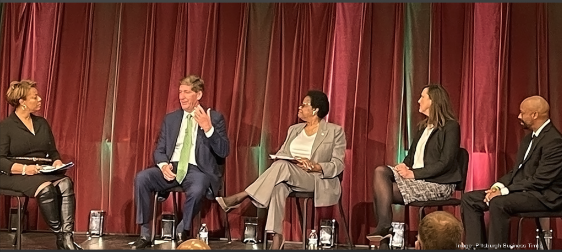Originally published: October 27, 2021
Pittsburgh Business Journal
The Covid-19 pandemic has pulled back the curtain to reveal gaps in the workforce, inequities and a tight labor market.
This was the topic of discussion for a panel of local leaders and Citizens Financial Group CEO Bruce Van Saun on Monday at the Benedum Center. Citizens (NYSE: CFG) is based in Providence, Rhode Island, but is Pittsburgh’s fourth-largest bank by deposit market share.
The panelists discussed Pittsburgh’s needs in the workforce, focusing on racial and social inequity gaps in the workforce and in educational opportunities.
Panelist Esther Bush, outgoing CEO and president of the Urban League of Greater Pittsburgh, and moderator and panelist Janis Burley Wilson, president of the August Wilson African American Cultural Center, discussed racial inequities in the workplace and the work that must be done to overcome them.
“We need to be very honest about where we, as a society, has placed the African American in terms of their opportunity to compete successfully,” Bush said. “And to be included and to maneuver something as great as a pandemic. If I were not surviving before, how am I surviving today?”
According to Bush, while Pittsburgh is poised to “solve its own problem,” with new growth in development in tech, health care and education, people of color are often not included.
Citizens has pledged a $45,000 grant to Partner4Work, a Pittsburgh nonprofit that partners with businesses to source and train job seekers. The funds will go towards the organization’s BankWorks training program, which acts as a gateway for entry-level employees looking to enter the banking industry in the region.
Robert Cherry, CEO of Partner4Work and a panelist, said that changes in hiring are already prominent, with employers considering candidates with associates’ degrees, work experience and/or high school diplomas more seriously in lieu of only considering candidates with four-year degrees or higher.
Citizens is also granting $25,000 to the Community College of Allegheny County in order to adapt its workforce development and training opportunities. Citizens previously granted $35,000 to the Crossroads Foundation, an organization that works with teens to ensure their success in college and their careers. Executive Director of Crossroads Esther Mellinger Stief was on the panel and said that the pandemic has widened the opportunity gap for students.
“The gap in what was available, what young people had access to, was vast,” Stief said. “It’s always been there, but the pandemic shone a light. You had students who were not in school for months. You had families who did not have access to the Internet, so it didn’t matter if they had technology, they didn’t have good Internet service, so they were not learning. You had students who have disappeared from school. This impacts us all; this is our workforce of tomorrow.”
The panelists all agreed that in order to solve issues of inequity and the gaps in the workplace, corporate communities, the private sector, the public sector and nonprofits must all work together.
“You must be intentional about doing this,” Bush said. “And you must wear it on your sleeve and be proud of it so that everybody knows it, so that your employees believe it.”
Bush and the other panelists thanked Van Saun for his participation in the panel, also saying that change must come “from the top down.”
“There’s a great aspect of our credo, where we talk about how we want our stakeholders, particularly our colleagues who work at Citizens to reach their potential,” Van Saun said. “And our communities to reach their potential and our customers to reach their potential. So you feel great as you’re going up and you’re meeting new challenges, and you’re having personal growth. If we can make that happen for everybody, then we’ve been successful, we can create a society of opportunity where people always have opportunities to keep reaching their potential.”

